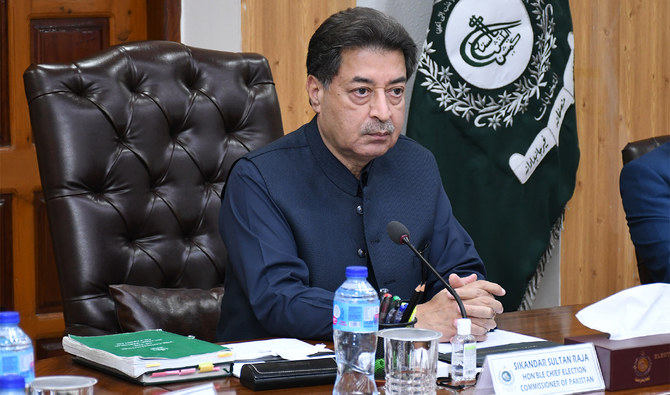ISLAMABAD: Former prime minister Imran Khan on Friday demanded Chief Election Commissioner Sikandar Sultan Raja and his top team to resign, following a Supreme Court decision criticizing them for misconstruing one of its verdicts and forcing candidates of Pakistan Tehreek-e-Insaf (PTI) party to contest the Feb. 8 polls independently.
The apex court upheld the Election Commission of Pakistan’s (ECP) decision to strip the PTI of its electoral symbol, the cricket bat, for holding intra-party elections that were deemed to be flawed and not in keeping with its constitution.
Subsequently, the ECP rejected the nomination papers of PTI candidates, who were listed as independents with individual electoral symbols.
The court decision that came just weeks before the general elections significantly impacted PTI’s ability to present a united front and contest the national polls with full preparation.
“I have repeatedly raised concerns about the prejudice exhibited by the Chief Election Commissioner of Pakistan against me and PTI,” Khan said in a social media post. “Today’s Supreme Court decision – establishing the ECP’s bias and malafide against PTI – reinforces our stance.”
“We demand criminal proceedings under Article 6 of the Constitution [that deals with treason] against all those responsible for disenfranchising millions of voters and supporters of Pakistan’s largest political party,” he continued. “Sikandar Sultan Raja and the ECP members must resign immediately!”
The former PM, who remains incarcerated on a number of charges since his arrest last August, reiterated that he wanted Chief Justice Qazi Faez Isa to distance himself from all the cases involving him or his party.
The Supreme Court delivered a landmark 8-5 verdict, saying the PTI party was eligible for these seats in parliament.
The short order made it clear the denial of the election symbol did not affect in any way PTI’s right to be a political party or participate in elections.
Reading portion of a minority verdict, Chief Justice of Pakistan Qazi Faez Isa noted the ECP had ‘misinterpreted’ the court’s earlier verdict related to PTI’s election emblem.
“The ECP by misinterpreting the judgment of this Court dated 13 January 2024, which was regarding non-holding [of] intra-party elections in PTI, wrongly mentioned the said candidates of the PTI as independents in Form 33 of the Election Rules,” he said. “The ECP had no authority to declare validly nominated candidates of a political party to be independent candidates.”
The PTI is currently entitled to around 23 reserved seats in the National Assembly, which does not affect the parliamentary majority of the Sharif-led coalition administration.
Political parties are allocated a total number of 70 reserved seats, including 60 for women and 10 for non-Muslims, in proportion to the number of seats won in general elections. This completes the National Assembly’s total 336 seats.
A simple majority in Pakistan’s parliament is 169 out of 336 seats.






















